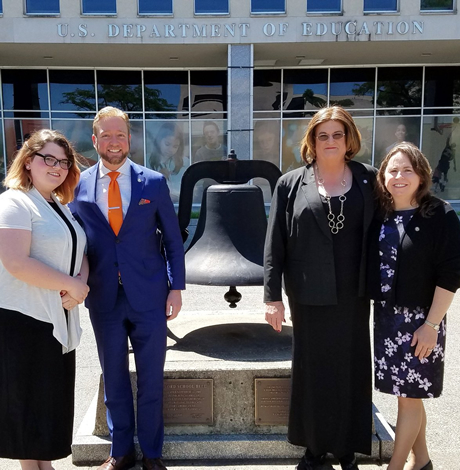homepage news
The bizarre history of Log Cabin’s presidential endorsements
Support for Trump’s re-election triggers controversy
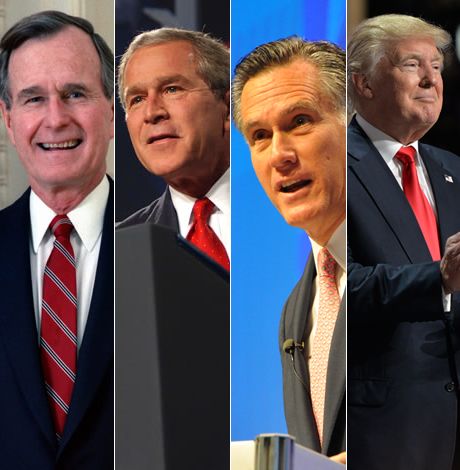
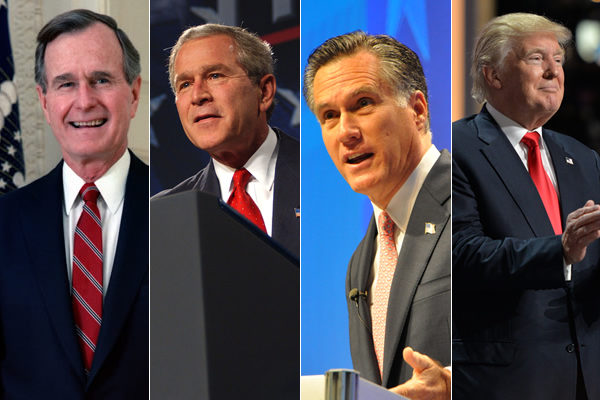
Perhaps no organization has inspired greater controversy within the LGBT community than the Log Cabin Republicans.
The group gets blamed by other LGBT advocates when GOP administrations attack the community. Meanwhile, straight Republicans are often unwelcoming to the gay Republican group, even hostile.
And controversy arrived again last week, as Log Cabin announced its support for Trump’s re-election in 2020 despite widespread anger over his racist tweets, harsh immigration policies, tariffs, general un-presidential demeanor, and, yes, anti-LGBT policies.
It’s more like white-hot rage. Jaws dropped, fingers wagged, tweets were sent and a former head of the D.C. chapter announced on Facebook he was finished with Log Cabin. How could an LGBT group endorse the same president who announced on Twitter he’d ban transgender people from the military “in any capacity?”
A look at Log Cabin’s endorsement history reveals the organization has been anything but consistent in its presidential endorsement decisions, even with respect to the LGBT rights records of the candidates. The only consistency, in fact, is the organization’s commitment to either endorse the Republican presidential candidate or not endorse him.
Here’s what has happened since Log Cabin began endorsing candidates in 1992:
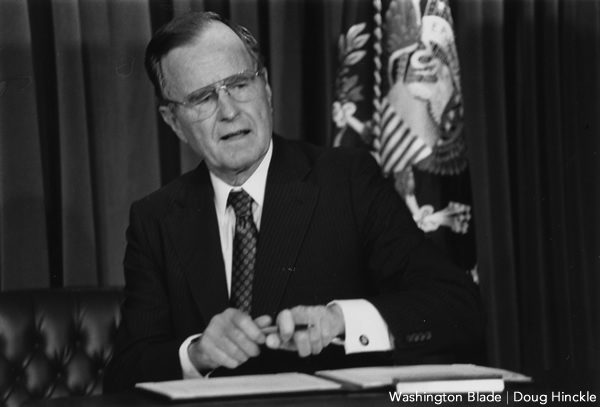
1992, George H.W. Bush
Endorsement: No
In its first known presidential endorsement decision, Log Cabin declined to endorse George H.W. Bush as he sought re-election in 1992. Bush was at the time the target of gay rights protesters for, like Ronald Reagan, not doing enough to address the raging AIDS epidemic.
The Blade could find no contemporaneous record of Log Cabin’s endorsement decision, but a 2004 Chicago Tribune article about Log Cabin indicates in 1992 the organization withheld its endorsement of Bush “because he did not denounce the anti-gay rhetoric at the GOP national convention in Houston.”
The year 1992 was when Pat Buchanan took the stage at the Republican National Convention and called for a “culture war…for the soul of America.” While the “Lock Her Up” chant became infamous in 2016, the chant during his speech was “Family Rights Forever! Gay Rights Never!”
Among the things Buchanan railed against was “abortion on demand, a litmus test for the Supreme Court, homosexual rights, discrimination against religious schools [and] women in combat.” Buchanan mocked the voice of a gay rights advocate, whom he called a “militant leader of the homosexual rights movement,” and said Clinton-Gore represents the most pro-gay ticket in U.S. history. “And so they do,” Buchanan surmised.
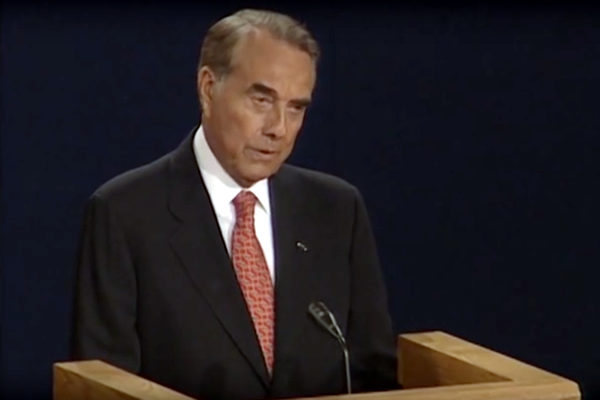
1996, Bob Dole
Endorsement: Yes
In perhaps its most unexpected endorsement decision, Log Cabin supported BobDole when he challenged Bill Clinton for the presidency in 1996.
Just the year before in 1995, the Dole campaign returned a $1,000 check from the organization, which was given as a result of Dole’s private commitments on AIDS legislation to Log Cabin chief Rich Tafel.
When a reporter inquired about the donation, the campaign gave the money back and informed her Dole was in “100 percent disagreement” with Log Cabin.
Later, under criticism, Dole expressed regret over giving the money back. “I think if they’d have consulted me, we wouldn’t have done that, wouldn’t have returned it,” Dole said.
After the flip-flop, Tafel met again with the Dole campaign, making demands about not tolerating anti-gay rhetoric at the Republican National Convention. Consequently, no such Buchanan-esque language was seen at the 1996 convention.
Soon after the agreement, Log Cabin members voted to support Dole at its annual convention in San Diego, marking the first time the group supported a presidential nominee.
“Our endorsement reflects both an acknowledgement that the Dole-Kemp ticket has made historic overtures in our direction and it provides us the opportunity to work with this campaign on the issues we care about,” Tafel said at the time.
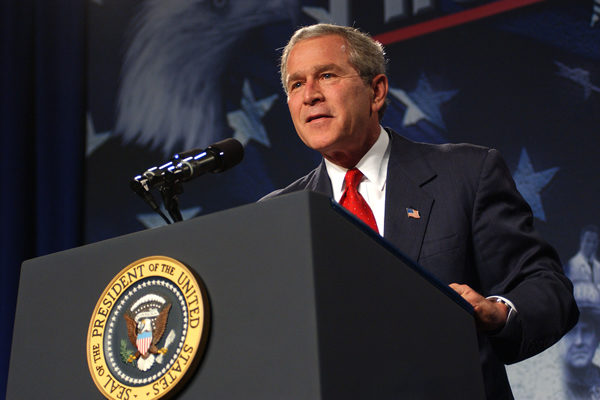
2000, George W. Bush
Endorsement: Yes
Given a second opportunity to endorse a Bush, Log Cabin decided to throw its support behind George W. Bush in the 2000 election against Al Gore.
According to Log Cabin’s website, the organization initially supported “maverick” John McCain in his challenge to Bush for the Republican nomination. After the primary, Bush reportedly refused to meet with Log Cabin.
Things changed, however, after Bush secured the GOP nod. A group of gay Republicans known as the “Austin 12” met with the candidate at this campaign headquarters. After the conversation, Bush emerged and said he was a “better man” for it. That meeting seemed to indicate a new day had arrived and formed the basis of Log Cabin’s endorsement.
The “Austin 12,” led by Charles Francis, included AIDS advocate Carl Schmid, David Catania, Scott Evertz, former Rep. Steve Gunderson and Rebecca Maestri.
They asked for a commitment to fight HIV/AIDS and having an openly gay speaker at the Republican National Convention. Bush came through with both requests, launching PEPFAR to fight the international AIDS epidemic and allowing Rep. Jim Kolbe to speak at the convention. But then, things changed yet again.
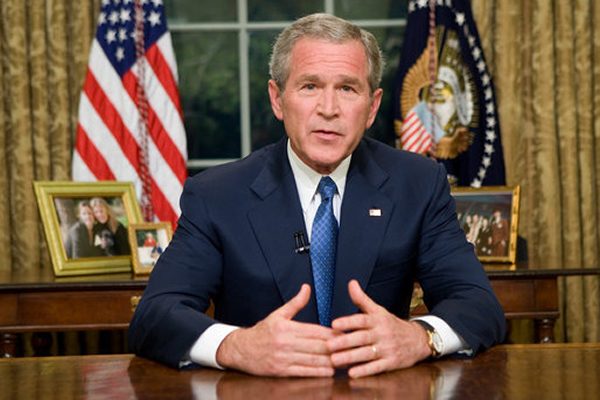
2004, George W. Bush
Endorsement: Hell no
Faced with an endless quagmire dragging down the U.S. military following his invasion of Iraq, Bush resorted to an age-old scapegoat to stoke fears to help him win re-election: Gays.
Drawing on (unfounded) fears after the Massachusetts Supreme Court legalized same-sex marriage in the Bay State in 2003, Bush called for passage of a Federal Marriage Amendment and made it a centerpiece of his re-election campaign.
Bush, in fact, called for a U.S. constitutional amendment to ban same-sex marriage nationwide in his 2004 State of the Union address.
“Activist judges…have begun redefining marriage by court order, without regard for the will of the people and their elected representatives,” Bush said. “On an issue of such great consequence, the people’s voice must be heard. If judges insist on forcing their arbitrary will upon the people, the only alternative left to the people would be the constitutional process. Our nation must defend the sanctity of marriage.”
Support for the Federal Marriage Amendment was a bridge too far for Log Cabin, whose board voted 22-2 against endorsing Bush for re-election.
“Certain moments in history require that a belief in fairness and equality not be sacrificed in the name of partisan politics; this is one of those moments,” Log Cabin chief Patrick Guerriero said. “The national board’s vote empowers Log Cabin to maintain its integrity while furthering our goal of building a more inclusive Republican Party.”
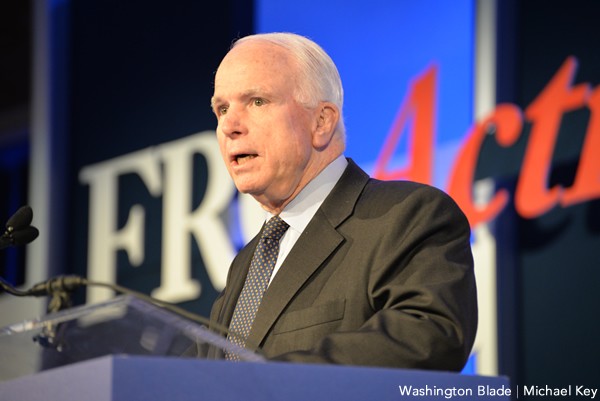
2008, John McCain
Endorsement: Yes
With McCain now having a bite at the apple for the Republican presidential nomination, Log Cabin had the choice of a new candidate to endorse for president.
McCain was indeed different. The Arizona Republican bucked his party and refused to support the Federal Marriage Amendment on the U.S. Senate floor.
But McCain’s stated reason for opposing the Federal Marriage Amendment was federalism grounds. (In 2006, McCain would take the anti-gay position and endorse a state constitutional amendment in Arizona when it came before voters.)
“The legal definition of marriage has always been left to the states to decide, in accordance with the prevailing standards of their neighborhoods and communities,” McCain said. “Certainly, that view has prevailed for many years in my party where we adhere to a rather stricter federalism than has always been the case in the prevailing views among our friends in the Democratic Party.”
Log Cabin’s board endorsed McCain by a 12-2 vote after the candidate met with the LGBT group.
Patrick Sammon, then-president of Log Cabin, said the candidate “showed courage by bucking his own party leadership and the president” on the Federal Marriage Amendment.
“We have honest disagreements with Sen. McCain on a number of gay rights issues, Log Cabin will continue our conversation with him and other Republican leaders about issues affecting gay and lesbian Americans,” Sammon said.
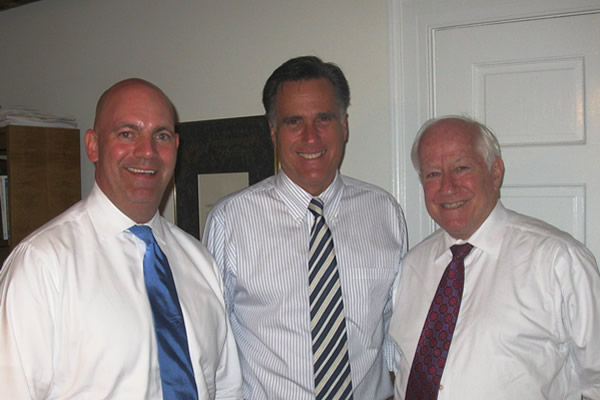
2012, Mitt Romney
Endorsement: Yes
In 2012, the Republican Party fielded former Massachusetts Gov. Mitt Romney to challenge Barack Obama in his bid for re-election.
The choice presented a dilemma for Log Cabin. Romney was governor of Massachusetts when the state court legalized same-sex marriage and fought tooth-and-nail against the ruling. Like Bush, Romney called for a Federal Marriage Amendment to ban gay nuptials.
R. Clarke Cooper, then-president of Log Cabin, and former Rep. Jim Kolbe met with Romney at a Virginia farmhouse for a brief five-minute meeting. The two gay Republicans appeared to have some vague commitment from Romney on employment non-discrimination protections, although nothing was firm.
That was good enough for Log Cabin, whose board endorsed Romney in a 14-1 vote.
“Despite our disagreement with Gov. Romney on the issue of marriage, on balance it is clear that in today’s economic climate, concern for the future of our country must be the highest priority,” Cooper said. “We are Republicans, and we agree with Gov. Romney’s vision for America in which success is a virtue, equal opportunity is ensured, and leaders recognize that it is the American people, not government, that build our nation and fuel its prosperity.”
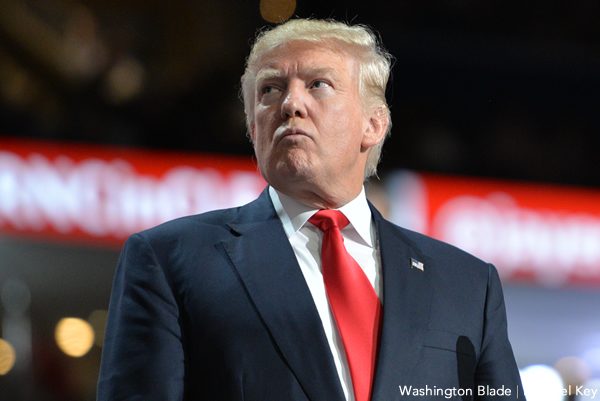
2016, Donald Trump
Endorsement: No
In 2016, political pundits saw Trump waving an upside-down rainbow Pride flag at a Colorado rally and concluded he was the most pro-gay Republican candidate in history.
In some respects, that’s right. Trump had in his private capacity as a businessperson attended a same-sex wedding and donated to HIV/AIDS groups. In his 2016 speech at the Republican National Convention, Trump in the aftermath of the Pulse nightclub shooting pledged to “protect our LGBTQ citizens from the violence and oppression of a hateful foreign ideology.”
But calling him a pro-gay candidate ignores his absence of pro-LGBT policy positions. Moreover, Trump’s campaign was based on animus toward minority groups — whether it be Muslims or immigrants.
Through an organizational statement, Log Cabin concluded Trump was “perhaps the most pro-LGBT presidential nominee in the history of the Republican Party,” but that wasn’t enough and withheld its endorsement.
“Log Cabin Republicans have long emphasized that we are not a single-issue organization, nor are our members single-issue voters,” the statement said. “Even if we were, rhetoric alone regarding LGBT issues does not equate to doctrine.”
What it boils down to is Trump — unlike McCain or Romney — refused to meet with Log Cabin, which was a criterion for the organization’s support. Still, Log Cabin did express concern with Trump’s policy on LGBT issues.
“As Mr. Trump spoke positively about the LGBT community in the United States, he concurrently surrounded himself with senior advisors with a record of opposing LGBT equality and committed himself to supporting legislation such as the so-called ‘First Amendment Defense Act’ that Log Cabin Republicans opposes.”
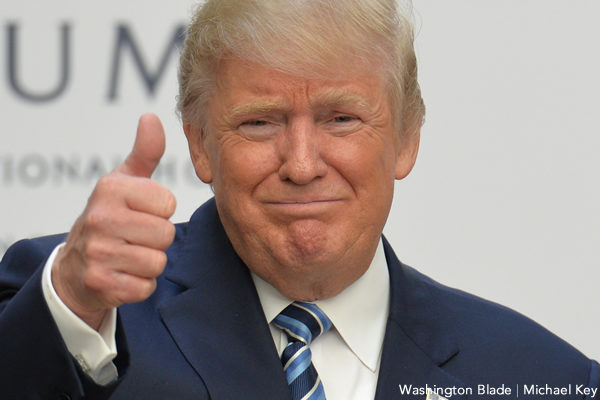
2020, Trump
Endorsement: Yes
Trump quickly built a reputation as an anti-LGBT president. His administration implemented a transgender military ban, took actions undermining LGBT rights in the name of “religious freedom” and excluded LGBT rights from the enforcement of federal civil rights laws like Title VII and Title IX.
At the same time, a new class of gay conservatives has emerged that, frankly, just doesn’t care about those issues. What’s more, they point to his appointment of Richard Grenell as U.S. ambassador of Germany as evidence that Trump is pro-gay. Grenell is supposedly spearheading a global initiative to decriminalize homosexuality, although there’s little evidence as yet of anything behind that plan.
On HIV/AIDS, the Trump administration has unveiled an ambitious plan to beat the HIV epidemic by 2030 by zeroing in on areas of new infections and hammering them with prevention and treatment tools.
As it turns out, that’s enough for an endorsement from Log Cabin. Board leaders Robert Kabel and Jill Homan announced their organization’s support for Trump’s re-election in an op-ed in the Washington Post.
“This is the party that Trump has helped make possible by moving past the culture wars that dominated the 1990s and early 2000s, in particular by removing gay rights as a wedge issue from the old Republican playbook,” Kabel and Homan wrote.
The endorsement was a striking departure from Log Cabin practice in many respects: Trump has never met with Log Cabin, the endorsement decision usually comes after the convention and executive director Jerri Ann Henry’s name is nowhere on the op-ed.
But if anything is revealed from reviewing Log Cabin’s history, it’s that departing from consistent practices is a constant in endorsement decisions.
homepage news
Honoring the legacy of New Orleans’ 1973 UpStairs Lounge fire
Why the arson attack that killed 32 gay men still resonates 50 years later

On June 23 of last year, I held the microphone as a gay man in the New Orleans City Council Chamber and related a lost piece of queer history to the seven council members. I told this story to disabuse all New Orleanians of the notion that silence and accommodation, in the face of institutional and official failures, are a path to healing.
The story I related to them began on a typical Sunday night at a second-story bar on the fringe of New Orleans’ French Quarter in 1973, where working-class men would gather around a white baby grand piano and belt out the lyrics to a song that was the anthem of their hidden community, “United We Stand” by the Brotherhood of Man.
“United we stand,” the men would sing together, “divided we fall” — the words epitomizing the ethos of their beloved UpStairs Lounge bar, an egalitarian free space that served as a forerunner to today’s queer safe havens.
Around that piano in the 1970s Deep South, gays and lesbians, white and Black queens, Christians and non-Christians, and even early gender minorities could cast aside the racism, sexism, and homophobia of the times to find acceptance and companionship for a moment.
For regulars, the UpStairs Lounge was a miracle, a small pocket of acceptance in a broader world where their very identities were illegal.
On the Sunday night of June 24, 1973, their voices were silenced in a murderous act of arson that claimed 32 lives and still stands as the deadliest fire in New Orleans history — and the worst mass killing of gays in 20th century America.
As 13 fire companies struggled to douse the inferno, police refused to question the chief suspect, even though gay witnesses identified and brought the soot-covered man to officers idly standing by. This suspect, an internally conflicted gay-for-pay sex worker named Rodger Dale Nunez, had been ejected from the UpStairs Lounge screaming the word “burn” minutes before, but New Orleans police rebuffed the testimony of fire survivors on the street and allowed Nunez to disappear.
As the fire raged, police denigrated the deceased to reporters on the street: “Some thieves hung out there, and you know this was a queer bar.”
For days afterward, the carnage met with official silence. With no local gay political leaders willing to step forward, national Gay Liberation-era figures like Rev. Troy Perry of the Metropolitan Community Church flew in to “help our bereaved brothers and sisters” — and shatter officialdom’s code of silence.
Perry broke local taboos by holding a press conference as an openly gay man. “It’s high time that you people, in New Orleans, Louisiana, got the message and joined the rest of the Union,” Perry said.
Two days later, on June 26, 1973, as families hesitated to step forward to identify their kin in the morgue, UpStairs Lounge owner Phil Esteve stood in his badly charred bar, the air still foul with death. He rebuffed attempts by Perry to turn the fire into a call for visibility and progress for homosexuals.
“This fire had very little to do with the gay movement or with anything gay,” Esteve told a reporter from The Philadelphia Inquirer. “I do not want my bar or this tragedy to be used to further any of their causes.”
Conspicuously, no photos of Esteve appeared in coverage of the UpStairs Lounge fire or its aftermath — and the bar owner also remained silent as he witnessed police looting the ashes of his business.
“Phil said the cash register, juke box, cigarette machine and some wallets had money removed,” recounted Esteve’s friend Bob McAnear, a former U.S. Customs officer. “Phil wouldn’t report it because, if he did, police would never allow him to operate a bar in New Orleans again.”
The next day, gay bar owners, incensed at declining gay bar traffic amid an atmosphere of anxiety, confronted Perry at a clandestine meeting. “How dare you hold your damn news conferences!” one business owner shouted.
Ignoring calls for gay self-censorship, Perry held a 250-person memorial for the fire victims the following Sunday, July 1, culminating in mourners defiantly marching out the front door of a French Quarter church into waiting news cameras. “Reverend Troy Perry awoke several sleeping giants, me being one of them,” recalled Charlene Schneider, a lesbian activist who walked out of that front door with Perry.

Esteve doubted the UpStairs Lounge story’s capacity to rouse gay political fervor. As the coroner buried four of his former patrons anonymously on the edge of town, Esteve quietly collected at least $25,000 in fire insurance proceeds. Less than a year later, he used the money to open another gay bar called the Post Office, where patrons of the UpStairs Lounge — some with visible burn scars — gathered but were discouraged from singing “United We Stand.”
New Orleans cops neglected to question the chief arson suspect and closed the investigation without answers in late August 1973. Gay elites in the city’s power structure began gaslighting the mourners who marched with Perry into the news cameras, casting suspicion on their memories and re-characterizing their moment of liberation as a stunt.
When a local gay journalist asked in April 1977, “Where are the gay activists in New Orleans?,” Esteve responded that there were none, because none were needed. “We don’t feel we’re discriminated against,” Esteve said. “New Orleans gays are different from gays anywhere else… Perhaps there is some correlation between the amount of gay activism in other cities and the degree of police harassment.”

An attitude of nihilism and disavowal descended upon the memory of the UpStairs Lounge victims, goaded by Esteve and fellow gay entrepreneurs who earned their keep via gay patrons drowning their sorrows each night instead of protesting the injustices that kept them drinking.
Into the 1980s, the story of the UpStairs Lounge all but vanished from conversation — with the exception of a few sanctuaries for gay political debate such as the local lesbian bar Charlene’s, run by the activist Charlene Schneider.
By 1988, the 15th anniversary of the fire, the UpStairs Lounge narrative comprised little more than a call for better fire codes and indoor sprinklers. UpStairs Lounge survivor Stewart Butler summed it up: “A tragedy that, as far as I know, no good came of.”
Finally, in 1991, at Stewart Butler and Charlene Schneider’s nudging, the UpStairs Lounge story became aligned with the crusade of liberated gays and lesbians seeking equal rights in Louisiana. The halls of power responded with intermittent progress. The New Orleans City Council, horrified by the story but not yet ready to take its look in the mirror, enacted an anti-discrimination ordinance protecting gays and lesbians in housing, employment, and public accommodations that Dec. 12 — more than 18 years after the fire.
“I believe the fire was the catalyst for the anger to bring us all to the table,” Schneider told The Times-Picayune, a tacit rebuke to Esteve’s strategy of silent accommodation. Even Esteve seemed to change his stance with time, granting a full interview with the first UpStairs Lounge scholar Johnny Townsend sometime around 1989.
Most of the figures in this historic tale are now deceased. What’s left is an enduring story that refused to go gently. The story now echoes around the world — a musical about the UpStairs Lounge fire recently played in Tokyo, translating the gay underworld of the 1973 French Quarter for Japanese audiences.
When I finished my presentation to the City Council last June, I looked up to see the seven council members in tears. Unanimously, they approved a resolution acknowledging the historic failures of city leaders in the wake of the UpStairs Lounge fire.
Council members personally apologized to UpStairs Lounge families and survivors seated in the chamber in a symbolic act that, though it could not bring back those who died, still mattered greatly to those whose pain had been denied, leaving them to grieve alone. At long last, official silence and indifference gave way to heartfelt words of healing.
The way Americans remember the past is an active, ongoing process. Our collective memory is malleable, but it matters because it speaks volumes about our maturity as a people, how we acknowledge the past’s influence in our lives, and how it shapes the examples we set for our youth. Do we grapple with difficult truths, or do we duck accountability by defaulting to nostalgia and bluster? Or worse, do we simply ignore the past until it fades into a black hole of ignorance and indifference?
I believe that a factual retelling of the UpStairs Lounge tragedy — and how, 50 years onward, it became known internationally — resonates beyond our current divides. It reminds queer and non-queer Americans that ignoring the past holds back the present, and that silence is no cure for what ails a participatory nation.
Silence isolates. Silence gaslights and shrouds. It preserves the power structures that scapegoat the disempowered.
Solidarity, on the other hand, unites. Solidarity illuminates a path forward together. Above all, solidarity transforms the downtrodden into a resounding chorus of citizens — in the spirit of voices who once gathered ‘round a white baby grand piano and sang, joyfully and loudly, “United We Stand.”

Robert W. Fieseler is a New Orleans-based journalist and the author of “Tinderbox: the Untold Story of the Up Stairs Lounge Fire and the Rise of Gay Liberation.”
homepage news
New Supreme Court term includes critical LGBTQ case with ‘terrifying’ consequences
Business owner seeks to decline services for same-sex weddings

The U.S. Supreme Court, after a decision overturning Roe v. Wade that still leaves many reeling, is starting a new term with justices slated to revisit the issue of LGBTQ rights.
In 303 Creative v. Elenis, the court will return to the issue of whether or not providers of custom-made goods can refuse service to LGBTQ customers on First Amendment grounds. In this case, the business owner is Lorie Smith, a website designer in Colorado who wants to opt out of providing her graphic design services for same-sex weddings despite the civil rights law in her state.
Jennifer Pizer, acting chief legal officer of Lambda Legal, said in an interview with the Blade, “it’s not too much to say an immeasurably huge amount is at stake” for LGBTQ people depending on the outcome of the case.
“This contrived idea that making custom goods, or offering a custom service, somehow tacitly conveys an endorsement of the person — if that were to be accepted, that would be a profound change in the law,” Pizer said. “And the stakes are very high because there are no practical, obvious, principled ways to limit that kind of an exception, and if the law isn’t clear in this regard, then the people who are at risk of experiencing discrimination have no security, no effective protection by having a non-discrimination laws, because at any moment, as one makes their way through the commercial marketplace, you don’t know whether a particular business person is going to refuse to serve you.”
The upcoming arguments and decision in the 303 Creative case mark a return to LGBTQ rights for the Supreme Court, which had no lawsuit to directly address the issue in its previous term, although many argued the Dobbs decision put LGBTQ rights in peril and threatened access to abortion for LGBTQ people.
And yet, the 303 Creative case is similar to other cases the Supreme Court has previously heard on the providers of services seeking the right to deny services based on First Amendment grounds, such as Masterpiece Cakeshop and Fulton v. City of Philadelphia. In both of those cases, however, the court issued narrow rulings on the facts of litigation, declining to issue sweeping rulings either upholding non-discrimination principles or First Amendment exemptions.
Pizer, who signed one of the friend-of-the-court briefs in opposition to 303 Creative, said the case is “similar in the goals” of the Masterpiece Cakeshop litigation on the basis they both seek exemptions to the same non-discrimination law that governs their business, the Colorado Anti-Discrimination Act, or CADA, and seek “to further the social and political argument that they should be free to refuse same-sex couples or LGBTQ people in particular.”
“So there’s the legal goal, and it connects to the social and political goals and in that sense, it’s the same as Masterpiece,” Pizer said. “And so there are multiple problems with it again, as a legal matter, but also as a social matter, because as with the religion argument, it flows from the idea that having something to do with us is endorsing us.”
One difference: the Masterpiece Cakeshop litigation stemmed from an act of refusal of service after owner, Jack Phillips, declined to make a custom-made wedding cake for a same-sex couple for their upcoming wedding. No act of discrimination in the past, however, is present in the 303 Creative case. The owner seeks to put on her website a disclaimer she won’t provide services for same-sex weddings, signaling an intent to discriminate against same-sex couples rather than having done so.
As such, expect issues of standing — whether or not either party is personally aggrieved and able bring to a lawsuit — to be hashed out in arguments as well as whether the litigation is ripe for review as justices consider the case. It’s not hard to see U.S. Chief Justice John Roberts, who has sought to lead the court to reach less sweeping decisions (sometimes successfully, and sometimes in the Dobbs case not successfully) to push for a decision along these lines.
Another key difference: The 303 Creative case hinges on the argument of freedom of speech as opposed to the two-fold argument of freedom of speech and freedom of religious exercise in the Masterpiece Cakeshop litigation. Although 303 Creative requested in its petition to the Supreme Court review of both issues of speech and religion, justices elected only to take up the issue of free speech in granting a writ of certiorari (or agreement to take up a case). Justices also declined to accept another question in the petition request of review of the 1990 precedent in Smith v. Employment Division, which concluded states can enforce neutral generally applicable laws on citizens with religious objections without violating the First Amendment.
Representing 303 Creative in the lawsuit is Alliance Defending Freedom, a law firm that has sought to undermine civil rights laws for LGBTQ people with litigation seeking exemptions based on the First Amendment, such as the Masterpiece Cakeshop case.
Kristen Waggoner, president of Alliance Defending Freedom, wrote in a Sept. 12 legal brief signed by her and other attorneys that a decision in favor of 303 Creative boils down to a clear-cut violation of the First Amendment.
“Colorado and the United States still contend that CADA only regulates sales transactions,” the brief says. “But their cases do not apply because they involve non-expressive activities: selling BBQ, firing employees, restricting school attendance, limiting club memberships, and providing room access. Colorado’s own cases agree that the government may not use public-accommodation laws to affect a commercial actor’s speech.”
Pizer, however, pushed back strongly on the idea a decision in favor of 303 Creative would be as focused as Alliance Defending Freedom purports it would be, arguing it could open the door to widespread discrimination against LGBTQ people.
“One way to put it is art tends to be in the eye of the beholder,” Pizer said. “Is something of a craft, or is it art? I feel like I’m channeling Lily Tomlin. Remember ‘soup and art’? We have had an understanding that whether something is beautiful or not is not the determining factor about whether something is protected as artistic expression. There’s a legal test that recognizes if this is speech, whose speech is it, whose message is it? Would anyone who was hearing the speech or seeing the message understand it to be the message of the customer or of the merchants or craftsmen or business person?”
Despite the implications in the case for LGBTQ rights, 303 Creative may have supporters among LGBTQ people who consider themselves proponents of free speech.
One joint friend-of-the-court brief before the Supreme Court, written by Dale Carpenter, a law professor at Southern Methodist University who’s written in favor of LGBTQ rights, and Eugene Volokh, a First Amendment legal scholar at the University of California, Los Angeles, argues the case is an opportunity to affirm the First Amendment applies to goods and services that are uniquely expressive.
“Distinguishing expressive from non-expressive products in some contexts might be hard, but the Tenth Circuit agreed that Smith’s product does not present a hard case,” the brief says. “Yet that court (and Colorado) declined to recognize any exemption for products constituting speech. The Tenth Circuit has effectively recognized a state interest in subjecting the creation of speech itself to antidiscrimination laws.”
Oral arguments in the case aren’t yet set, but may be announced soon. Set to defend the state of Colorado and enforcement of its non-discrimination law in the case is Colorado Solicitor General Eric Reuel Olson. Just this week, the U.S. Supreme Court announced it would grant the request to the U.S. solicitor general to present arguments before the justices on behalf of the Biden administration.
With a 6-3 conservative majority on the court that has recently scrapped the super-precedent guaranteeing the right to abortion, supporters of LGBTQ rights may think the outcome of the case is all but lost, especially amid widespread fears same-sex marriage would be next on the chopping block. After the U.S. Tenth Circuit Court of Appeals ruled against 303 Creative in the lawsuit, the simple action by the Supreme Court to grant review in the lawsuit suggests they are primed to issue a reversal and rule in favor of the company.
Pizer, acknowledging the call to action issued by LGBTQ groups in the aftermath of the Dobbs decision, conceded the current Supreme Court issuing the ruling in this case is “a terrifying prospect,” but cautioned the issue isn’t so much the makeup of the court but whether or not justices will continue down the path of abolishing case law.
“I think the question that we’re facing with respect to all of the cases or at least many of the cases that are in front of the court right now, is whether this court is going to continue on this radical sort of wrecking ball to the edifice of settled law and seemingly a goal of setting up whole new structures of what our basic legal principles are going to be. Are we going to have another term of that?” Pizer said. “And if so, that’s terrifying.”
homepage news
Kelley Robinson, a Black, queer woman, named president of Human Rights Campaign
Progressive activist a veteran of Planned Parenthood Action Fund

Kelley Robinson, a Black, queer woman and veteran of Planned Parenthood Action Fund, is to become the next president of the Human Rights Campaign, the nation’s leading LGBTQ group announced on Tuesday.
Robinson is set to become the ninth president of the Human Rights Campaign after having served as executive director of Planned Parenthood Action Fund and more than 12 years of experience as a leader in the progressive movement. She’ll be the first Black, queer woman to serve in that role.
“I’m honored and ready to lead HRC — and our more than three million member-advocates — as we continue working to achieve equality and liberation for all Lesbian, Gay, Bisexual, Transgender, and Queer people,” Robinson said. “This is a pivotal moment in our movement for equality for LGBTQ+ people. We, particularly our trans and BIPOC communities, are quite literally in the fight for our lives and facing unprecedented threats that seek to destroy us.”
The next Human Rights Campaign president is named as Democrats are performing well in polls in the mid-term elections after the U.S. Supreme Court overturned Roe v. Wade, leaving an opening for the LGBTQ group to play a key role amid fears LGBTQ rights are next on the chopping block.
“The overturning of Roe v. Wade reminds us we are just one Supreme Court decision away from losing fundamental freedoms including the freedom to marry, voting rights, and privacy,” Robinson said. “We are facing a generational opportunity to rise to these challenges and create real, sustainable change. I believe that working together this change is possible right now. This next chapter of the Human Rights Campaign is about getting to freedom and liberation without any exceptions — and today I am making a promise and commitment to carry this work forward.”
The Human Rights Campaign announces its next president after a nearly year-long search process after the board of directors terminated its former president Alphonso David when he was ensnared in the sexual misconduct scandal that led former New York Gov. Andrew Cuomo to resign. David has denied wrongdoing and filed a lawsuit against the LGBTQ group alleging racial discrimination.

-

 Sports5 days ago
Sports5 days agoTrans cyclist’s victory sparks outrage in conservative media
-

 Congress5 days ago
Congress5 days agoCongress passes ‘Big, Beautiful Bill’ with massive cuts to health insurance coverage
-

 Israel5 days ago
Israel5 days agoActivist recalls experience in Tel Aviv after Israel-Iran war began
-

 Celebrity News5 days ago
Celebrity News5 days agoNina West’s ‘Sugar in the Tank’ tour comes to Rehoboth Beach


